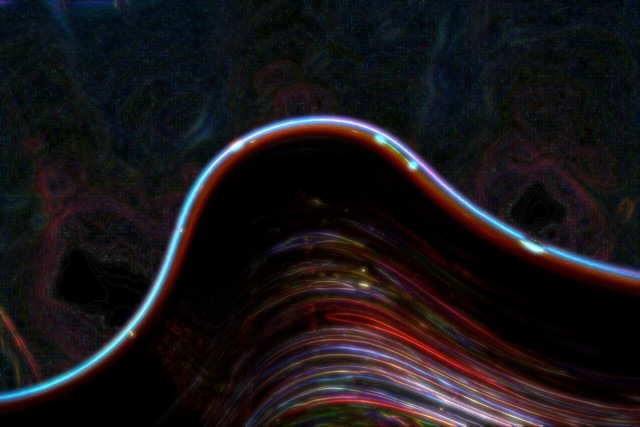We’ve all had that feeling of disorientation at some point.
Perhaps you are staying in a hotel somewhere, or visiting family for a few days. You wake up in the middle of the night and don’t know where you are. The room is unfamiliar. You feel lost. You look for points of familiarity to locate yourself. It takes a few moments to happen. Then, clarity! You remember where you are – are able to locate yourself in time and space – the unease passes quickly. You understand what has happened.
I recently had an experience that was both similar to this and different.
It was a weekday evening, and I had gone to bed at around 11:30 pm. – probably a little later than usual. Another variable was that my wife was staying up later than me, working on an assignment for one of her master’s degree courses. That, also, is out of our ordinary routine.
 About an hour after going to bed, around 12:30 a.m., I woke up with a feeling that something was wrong. I had a good sense of where I was, and I registered that Becky was not in bed. But I also had a deep sense that someone was missing. It was late at night and someone who was supposed to be there wasn’t there. My sense was that it was dad who was missing.
About an hour after going to bed, around 12:30 a.m., I woke up with a feeling that something was wrong. I had a good sense of where I was, and I registered that Becky was not in bed. But I also had a deep sense that someone was missing. It was late at night and someone who was supposed to be there wasn’t there. My sense was that it was dad who was missing.
As I sat up on the edge of the bed, I wasn’t picturing or thinking about my own father, who lives some 6 hours away. I was just thinking about some “dad” whose identity I didn’t really understand – I was very confused and at a loss, both as to who this missing person was and as to why he wasn’t where he was supposed to be.
I walked downstairs, in this confused state, to the lighted living room. Becky was sitting at the dining room table. In my very real disorientation, I stood in a doorway and asked her two or three times: “Where’s dad?” In that moment I had no sense of my own kids and felt at a loss about my own self, though I did know who Becky was. I stood there in confusion and distress, concerned about where to find this person and feeling that I didn’t know who I was in this particular place and context.
Becky was also confused, at first thinking that I was repeating, for her, words that one of our kids had spoken in their sleep: “Where’s dad?” I remember the confusion on Becky’s face. And it was only as she got up and and come toward me that I moved gradually from fog and anxiety and confusion into clarity. After a moment, still a little hazy, I said to her:
“It’s ok now. It’s ok, now. I know. I’m dad.”
 At that moment I experienced a version of the relief we have all experienced in some strange bedroom. I was anxious and confused, without points of relational familiarity to locate and know myself. When everything came into focus, the anxiety and confusion faded. The relief I experienced at that moment, I must say, was greater than in any such past experience of dislocation.
At that moment I experienced a version of the relief we have all experienced in some strange bedroom. I was anxious and confused, without points of relational familiarity to locate and know myself. When everything came into focus, the anxiety and confusion faded. The relief I experienced at that moment, I must say, was greater than in any such past experience of dislocation.
Now, different people will respond differently to such an experience. Some of us would laugh it off: “Wow, that was crazy. I must have been half-awake and still in dreamland.” Others of us will be profoundly anxious in the aftermath: “Do I have dementia? Is there something wrong with me?” Still others of us might take it as a curious opportunity to psychoanalyze ourselves: “Who is “dad” anyway, and what does this mean about my deepest self?”
After the initial relief at “finding myself”, my immediate response was one of continued worry and anxiety (I have had experiences with anxiety in the past). A day later (and having had a bit more sleep) my response has moved toward the “Wow, that was crazy” end of the spectrum. And I realize that many others have probably and similar experiences.
But what to make of such an experience; and how to let it shape me as a person? This momentary experience, like every other human experience, might shape me in ways I can’t control or explain. But it is also possible to intentionally incorporate it within my life and identity, particularly my life as a follower of Christ. Let me offer a few thoughts.
 THERE IS SOME POSSIBILITY OF GREATER UNDERSTANDING AND EMPATHY WITH THOSE WHO SUFFER FROM DEMENTIA. My momentary loss of perspective and assurance (my short-lived loss of fixed relational points for understanding myself) is perhaps a small taste of what is experienced by those who suffer from dementia, particularly in its later stages.
THERE IS SOME POSSIBILITY OF GREATER UNDERSTANDING AND EMPATHY WITH THOSE WHO SUFFER FROM DEMENTIA. My momentary loss of perspective and assurance (my short-lived loss of fixed relational points for understanding myself) is perhaps a small taste of what is experienced by those who suffer from dementia, particularly in its later stages.
As a pastor I have prayed with those at different stages of Alzheimer’s, or sat quietly at their bedside. I have prayed with and visited with those who are in the early stages of dementia. Often I have felt utterly distant from their experiences and pain. I’m not going to say that I now understand their suffering. Not at all. But I can and should understand my own brief experience of anxiety and relational disorientation as an invitation to deeper understanding and compassion.
That is, my very real moment of anxiety/confusion/vertigo is not something merely to be rushed past, and forgotten about, if possible. Rather this experience is part of the broad human experience. And by the grace of the Christ it can be incorporated into a more faithful service to, and care of, sisters and brothers. This applies to all of us, of course, not just “ministers.” And perhaps a first step (or at least a decidedly important step) into such faith-full empathy is prayer with and for those who suffer – remembering those who are losing memory.
A DEEPER QUESTION OF FAITH ALSO ARISES: WHAT DOES IT MEAN TO BELONG TO CHRIST WHEN A PERSON SEEMS TO BE LOSING HIM OR HERSELF’? The question could also be phrased this way: “How can I understand and experience my belonging to Christ when the ‘I’ is so dramatically altered or diminished?” Of course this is a massive issue – both theologically and biological speaking. And in many ways I am not competent to explore it.
 John Swinton (in his book Dementia: Living in the Memories of God) suggests that we should hesitate over the idea that the self is somehow lost in the loss of memory. Notwithstanding the great fear of memory-loss in our culture, and notwithstanding the anxiety experienced by some with dementia, he suggests that it is wiser and more faithful to see dementia as a journey toward a different way of being a self.
John Swinton (in his book Dementia: Living in the Memories of God) suggests that we should hesitate over the idea that the self is somehow lost in the loss of memory. Notwithstanding the great fear of memory-loss in our culture, and notwithstanding the anxiety experienced by some with dementia, he suggests that it is wiser and more faithful to see dementia as a journey toward a different way of being a self.
But another of Swinton’s important suggestions is that, for those with memory loss, the decisive variable is God’s remembering of us, now and in every moment. Swinton’s own words are helpful:
[I]t becomes clear that to suggest that God remembers persons with advanced dementia is not a palliative avoidance of the real truth that they have lost their identity. Neither is it an abandonment of these people by God in the present [as if God will only remember them in some future moment]. Quite the opposite. It is a firm statement that God is with and for them and that God is acting with and for them in the present as they move toward God’s future (pg. 217)
And:
We are who we are because God remembers us and holds us in who we are. We are who we are now and will be who we will be in the future because God continues to remember us. (pg. 218)
Perhaps the final word should be given to the Psalmist, who writes: “You hedge me before and behind; You lay Your hand upon me. It is beyond my knowledge; it is a mystery; I cannot fathom it. Where can I escape from your Spirit? Where can I flee from your presence? If I ascend to heaven, You are there; if I descend to Sheol, You are there too.” (Psalm 129, Tanakh, New JPS translation)
